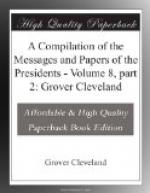A. LINCOLN.
PRESIDENT’S SPECIAL WAR ORDER No. 3
EXECUTIVE MANSION,
Washington, March 11, 1862.
Major-General McClellan having personally taken the field at the head of the Army of the Potomac, until otherwise ordered he is relieved from the command of the other military departments, he retaining command of the Department of the Potomac.
Ordered further, That the departments now under the respective commands of Generals Halleck and Hunter, together with so much of that under General Buell as lies west of a north and south line indefinitely drawn through Knoxville, Tenn., be consolidated and designated the Department of the Mississippi, and that until otherwise ordered Major-General Halleck have command of said department.
Ordered also, That the country west of the Department of the Potomac and east of the Department of the Mississippi be a military department, to be called the Mountain Department, and that the same be commanded by Major-General Fremont.
That all the commanders of departments, after the receipt of this order by them, respectively report severally and directly to the Secretary of War, and that prompt, full, and frequent reports will be expected of all and each of them.
ABRAHAM LINCOLN.
WAR DEPARTMENT, March 13, 1862.
Major-General GEORGE B. MCCLELLAN:
The President, having considered the plan of operations agreed upon by yourself and the commanders of army corps, makes no objection to the same, but gives the following directions as to its execution:
1. Leave such force at Manassas Junction as shall make it entirely certain that the enemy shall not repossess himself of that position and line of communication.
2. Leave Washington entirely secure.
3. Move the remainder of the force down the Potomac, choosing a new base at Fortress Monroe, or anywhere between here and there, or, at all events, move such remainder of the army at once in pursuit of the enemy by some route.
EDWIN M. STANTON,
Secretary of War.
[From the Daily National Intelligencer, March 28, 1862.]
NAVY DEPARTMENT, March 15, 1862.
Lieutenant JOHN L. WORDEN, United States Navy,
Commanding United States Steamer Monitor, Washington.
SIR: The naval action which took place on the 10th instant between the Monitor and Merrimac at Hampton Roads, when your vessel, with two guns, engaged a powerful armored steamer of at least eight guns, and after a few hours’ conflict repelled her formidable antagonist, has excited general admiration and received the applause of the whole country.
The President directs me, while earnestly and deeply sympathizing with you in the injuries which you have sustained, but which it is believed are but temporary, to thank you and your command for the heroism you have displayed and the great service you have rendered.




